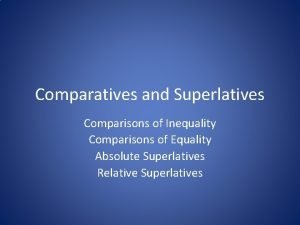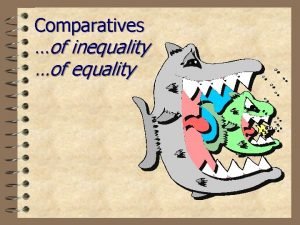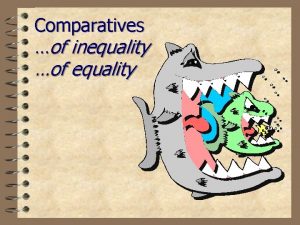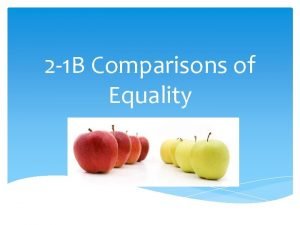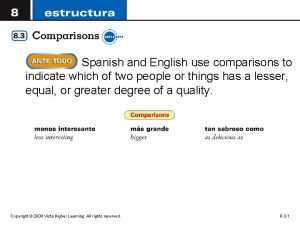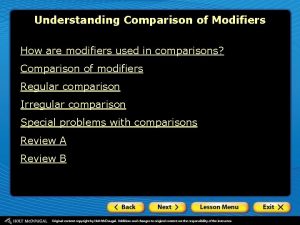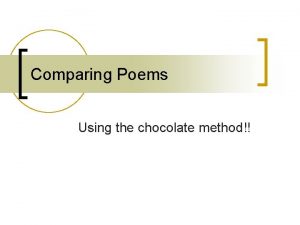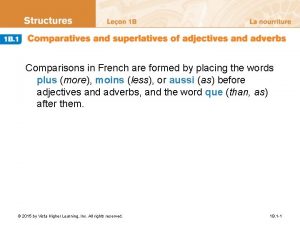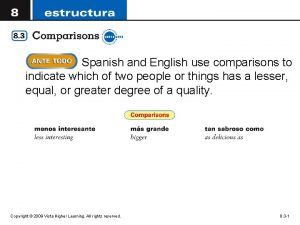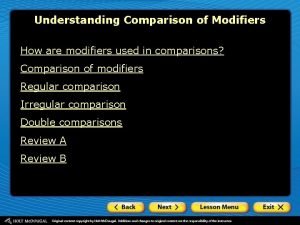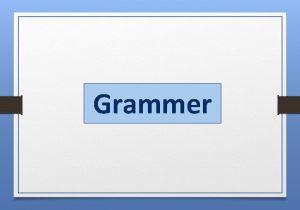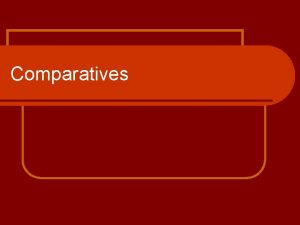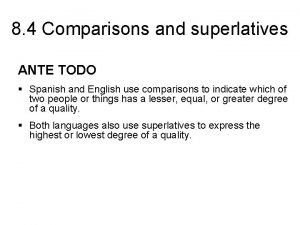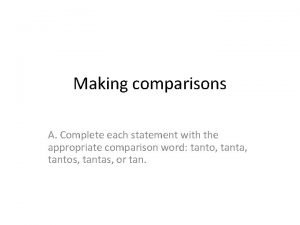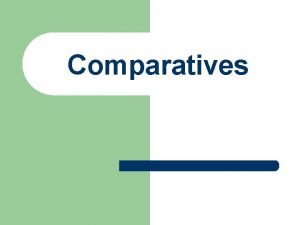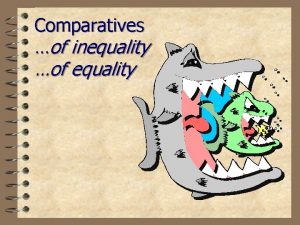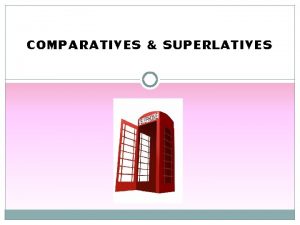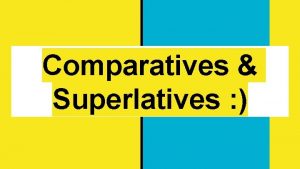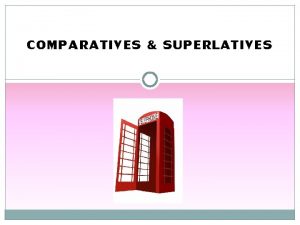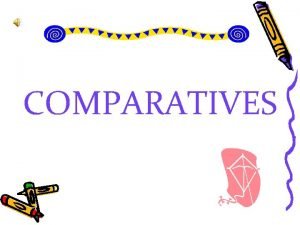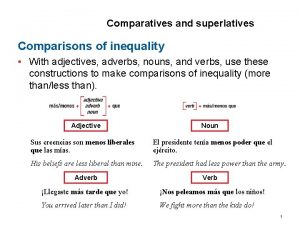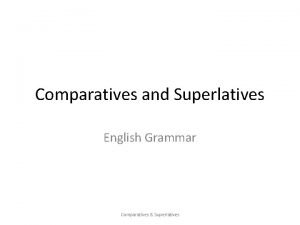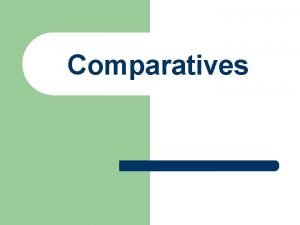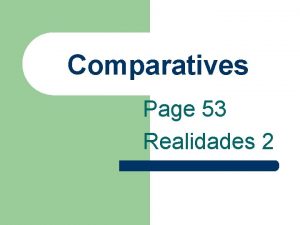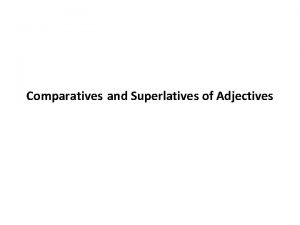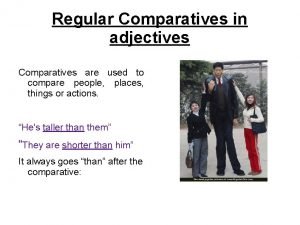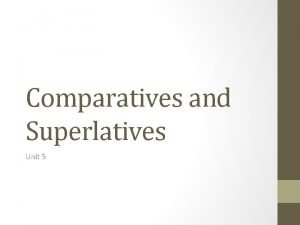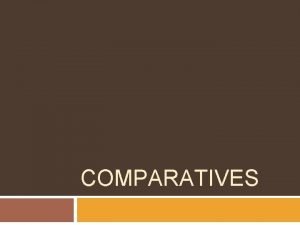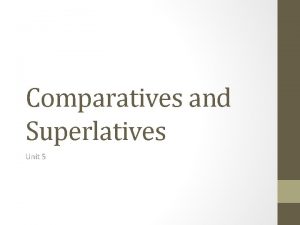Comparatives of inequality of equality COMPARISONS 4 In































- Slides: 31

Comparatives …of inequality …of equality

COMPARISONS 4 In Spanish, as in English, comparative constructions are used to compare adjectives, nouns or adverbs with one another. When comparing the quality of one thing to that of another, there are 3 possibilities: more than, less than, or equal.

Comparative of Equality: ADJECTIVES …. tan + adjective + como…. …. as + adjective + as…. En Pope High School , el fútbol americano es tan popular como el baloncesto.

Por ejemplo: 4 1. Marisa is as pretty as a rose. 4 Marisa es tan bonita como una rosa. 4 2. The Spanish students are as smart as French students. 4 Los estudiantes de español son tan inteligentes como los estudiantes de francés.

A bit of grammar before we continue…. 4 What’s an adverb? ? 4 It describes a verb or adjective. 4 It ends in –ly in English, and –mente in Spanish.

tan + ADVERB + como 4 as __adverb__ as 4 tan __adverbio__ como 4 Examples: 4 1. Jorge walks as slowly as a turtle. 4 Jorge corre tan _______ como una tortuga. 4 2. We run as quickly as a jaguar. 4 Corremos tan _____ como un jaguar.

Comparative of Equality: SUSTANTIVO …. tanto(s) +noun tanta(s) +noun …. as much +noun …as many +noun +como…. +as…. Hay tantas chicas como chicos en el club de español. tanto (o, os, a, as) need to agree in number and gender with the noun

¡OJO! 4 ¡Atención! Note that unlike tan, tanto acts as an adjective and therefore agrees in number and gender with the noun it modifies.

Ejemplos 4 1. I have as much homework as the students. 4 Tengo tanta tarea como los estudiantes. 4 2. We read as many books in other classes as in this class. 4 Leemos tantos libros en otras clases como en esta clase. 4 3. You play as many instruments as Jorge. 4 Tocas tantos instrumentos como Jorge.

as much as = tanto como 4 Comparisons of equality with verbs are formed by placing tanto como after the verb. Note that in this construction tanto does not change in number or gender.

tanto como = as much as

Práctica: Write one sentence that combines the information in a comparative statement. 4 1. La comida de este restaurante es sabrosa. La comida de mi mamá también es sabrosa. ________________________. 4 2. Yo tengo 6 manzanas y Julia tiene 6 manzanas también. ______________________ 4 3. Nicolás es guapo. Mis hermanos son guapos también. Mis hermanos _________________. 4 4. La sopa es rica. El bistec es rico. _________________.

Comparative of inequality a. Greater than, more than=“-er” …. más + adjective + que …more + adjective + than b. Lesser, less than …. menos + adjective + que … less + adjective + than NOTE! Adjectives need to agree in # and gender


Ejemplos: 4 Las chicas son más inteligentes que los chicos. 4 Soy más alta que Paco. 4 Los coches son más rápidos que las bicis. 4 Su computadora es menos cara que la computadora de Paul. 4 La clase de historia es menos interesante que esta clase.

¡Uf! 4 When the comparison involves a numerical expression (a number), de is used before the number instead of que to mean “than”.

Practica 4 1. María compró 5 manzanas pero Pepe compró 10. Pepe 4 4 ________________ 2. Juana tiene 3 almuerzos para sus amigos. Juana tiene _____________ 2 almuerzos. 3. Yo quiero 2 pedazos de Pizza. Mi hermano quiere 8 pedazos! Yo ________________ 4 Julieta viajó a 5 ciudades durante las vacaciones. Yo no viaje. Julieta _________________. 5. Yo compré 7 libros. Yo _________ 5 libros.

Irregular Comparatives Better than Worse than mejor, mejores que peor, peores que Older than mayor, mayores que Younger than menor, menores que


Ejemplos • La clase de español es mejor que la clase de matemáticas. • Ana es menor que Elena

With verbs…. 4 With verbs, this construction is used to make comparisons of inequality.

Escribe el equivalente de las palabras en inglés. 1. Ernesto mira más televisión _____ (than) Alberto. 2. Tú eres _____ (less) simpático que Federico. 3. La camarera sirve _____ (as much) carne como pescado. 4. Conozco _____ (more) restaurantes que tú. 5. No estudio _____ (as much as) tú. 6. ¿Sabes jugar al tenis tan bien _____ (as) tu hermana? 7. ¿Puedes beber _____ (as many) refrescos como yo? 8. Mis amigos parecen _____ (as) simpáticos como ustedes.

FIN de comparativos

SUPERLATIVES 4 Both English and Spanish use superlatives to express the highest or lowest degree of a quality.

Superlatives This construction is used to form superlatives. Note that the noun is always preceded by a definite article (el, la, los, las). Note that de is equivalent to the English in or of.

Superlatives 4 The noun can be omitted if the person, place, or thing referred to is clear.

Superlatives 4 ¡Atención! While más alone means more, after el, la, los, or las, it means most. Likewise, menos can mean less or least. Es el café más rico del país. It’s the most delicious coffee in the country. Es el menú menos caro de todos éstos. It is the least expensive menu of all of these.

Superlatives: los irregulares

Superlatives: Absolute superlatives 4 The absolute superlative is equivalent to extremely, super, or very. To form the absolute superlative of most adjectives and adverbs, drop the final vowel, if there is one, and add -ísimo/a(s).

Superlatives: Absolute superlatives 4 Note these spelling changes:

Superlatives: ¡Inténtalo! Escribe el equivalente de las palabras en inglés. 4 1. Marisa es ________ (the most intelligent) de todas. 4 2. Ricardo y Tomás son _____ (the least boring) de la fiesta. 4 3. Miguel y Antonio son _____ (the worst) estudiantes de la clase. 4 4. Mi profesor de biología es _____ (the oldest) de la escuela.
 Comparative of inequality
Comparative of inequality Comparison of equality ejemplos
Comparison of equality ejemplos Equality and inequality ejemplos
Equality and inequality ejemplos Confused comparative and superlative
Confused comparative and superlative Comparatives equality
Comparatives equality Tú eres 1 of 1 (less) simpático que federico.
Tú eres 1 of 1 (less) simpático que federico. Comparison of equality ejemplos
Comparison of equality ejemplos Lesson 1-6 compound inequalities
Lesson 1-6 compound inequalities Equality and inequality symbols
Equality and inequality symbols Formal equality vs substantive equality
Formal equality vs substantive equality Cedaw article
Cedaw article L
L Figure of speech for comparison
Figure of speech for comparison Irregular adverb
Irregular adverb When to use planned contrasts
When to use planned contrasts Comparison of modifiers
Comparison of modifiers Planned comparisons
Planned comparisons Internet price comparisons
Internet price comparisons Poems with comparisons
Poems with comparisons Comparisons in french
Comparisons in french Bad的superlative
Bad的superlative Comparisons of adjectives and adverbs
Comparisons of adjectives and adverbs Tú eres 1 of 1 (less) simpático que federico.
Tú eres 1 of 1 (less) simpático que federico. Modifiers of comparisons
Modifiers of comparisons Parallel structure with comparisons
Parallel structure with comparisons Quantifiers to make comparisons
Quantifiers to make comparisons What are comparisons
What are comparisons Pictures to make comparisons
Pictures to make comparisons Absolute superlative of delicioso
Absolute superlative of delicioso Capitulo 1b making comparisons
Capitulo 1b making comparisons Realidades 2 capitulo 1b making comparisons answers
Realidades 2 capitulo 1b making comparisons answers Comparisons with as
Comparisons with as
